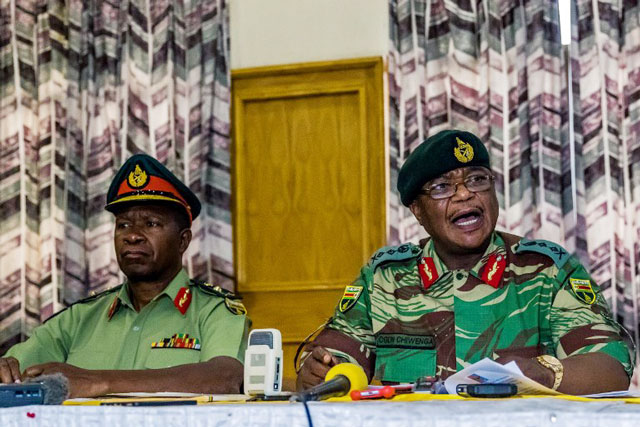
How Zimbabwe military discovered it may not be so easy to remove Mugabe
Harare, Zimbabwe | KEVIN SIEF | When Zimbabwe’s military detained President Robert Mugabe on Tuesday night, Nov.14, it seemed the stage had been set for the ouster of Africa’s oldest leader.
Two days later, it was clear that it might not be so easy.
On Thursday Nov.14 Mugabe, 93, entered into talks with the military commanders who placed him under house arrest and with officials from neighboring South Africa. His motorcade streaked through the city without any army escort, indicating that he had at least some freedom of movement. In a photo from Thursday’s talks released by the government newspaper, he was smiling with his arm around the army commander responsible for the military takeover, appearing untroubled.
For the 37 years he has ruled Zimbabwe — from independence to the verge of economic collapse — Mugabe has outwitted his opponents at every turn, using intimidation, electoral manipulation and purges of his own party. Now Zimbabweans are wondering: Will he find a way to survive a coup?
By Thursday night, there were hints that Mugabe had at least bought himself some time. In meetings with a high-profile Zimbabwean Catholic priest and with military commanders, Mugabe resisted requests to step down, according to interviews with officials and media reports.
On Friday The Zimbabwean military released a statement saying that “significant progress” has been made in its efforts to apprehend members of President Robert Mugabe’s government.
But negotiations with Mugabe were still ongoing, it added, referring obliquely to “the way forward” without explaining if commanders were seeking Mugabe’s ouster or a different kind of negotiated settlement.
“You will be advised of the outcome as soon as is possible,” it said.
Many people would be happy to see him leave office. Mugabe has become deeply unpopular at home because of his repressive tactics and the country’s steep economic decline during his rule. Abroad, he has been criticized for his authoritarian rule and his seizure of farms owned by the white minority. He has regularly denounced the West for many of his nation’s ills.
And yet the military’s role in detaining Mugabe has become a flash point for a region that has attempted to enshrine democratic values in its charter.
Zimbabwean military leaders were aware of the sensitivities; after troops detained Mugabe and took over the state television station, a top general said early Wednesday that it was “not a military takeover.” The military leaders were prompted to act after former vice president and onetime defense minister Emmerson Mnangagwa was fired this month, paving the way for Mugabe’s wife, Grace, to succeed him as president.
At least publicly, the military has said it won’t push Mugabe to leave — even though it effectively took control of the government.
“The elephant in the room is the constitutional issue,” said Ibbo Mandaza, a Zimbabwean academic, referring to the illegality of the military takeover. “This is a region where coups are not tolerated.”
While some countries in southern Africa have evident democratic shortcomings, there have been few coups in recent decades. Many are still led by the parties that fought for independence from colonial rule.
The Southern Africa Development Community (SADC), a regional body of 15 nations, met in Botswana on Thursday to discuss the situation and seemed to tilt toward Mugabe and against the military takeover. In an outline of issues discussed in the meeting, the body described the “unconstitutional removal of democratically elected governments.”
 The Independent Uganda: You get the Truth we Pay the Price
The Independent Uganda: You get the Truth we Pay the Price


